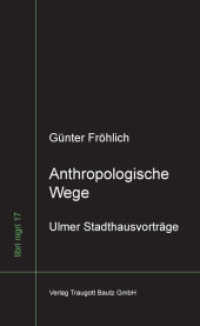- ホーム
- > 洋書
- > 英文書
- > Politics / International Relations
Full Description
This book revisits many aspects of current social science theories, such as actor-network theory and the French school of science and technology studies, to test how the theories apply in a specific situation, in this case after 1991 in the city of Cherepovets in Russia, home of Russia's second biggest steel producer, Severstal. Using political philosophy to analyse the down-to-earth details of the real techno-scientific problems facing the world, the book examines the role of things - and urban infrastructure in particular - in political change. It considers how the city's infrastructure, including housing, ICT networks, the provision of public utilities of all kinds, has been transformed in recent years; examines the roles of different actors including the municipal authorities, and explores citizens' differing and sometimes contradictory images of their city. It includes a great deal of new thinking on how communities are built, how common action is initiated to provide public goods, and how the goods themselves - physical things - are a crucial driver of community action and community building, arguably more so than more abstract social and human forces.
Contents
Introduction: The Theory of Res Publica and Contemporary Russia: How Do Things Matter Together with Publics? Part 1: Links with Conventional Theories 1. Goods, Res Publica, Actor-Networks, and Collective Action 2. Categories of Goods in Economics and Public Choice Literature as Applied to Heat and Water Utilities Part 2: Case Studies 3. Things and People in the Housing and Utility Sector Reform in Russia, 1991-2006 4. Common and Dividing Things in Homeowners' Associations 5. Looking for the Common and the Public in a Town. Conclusion: Commonality at Different Levels: Infrastructures of Liberty








